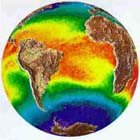India advocates equity in global climate change negotiations: Shyam Saran
 Mumbai, Apr. 21: "India's stand in international negotiations is based on the simple principle – "The polluter pays", said Shyam Saran, Special Envoy to the Prime Minister on Climate Change, at a seminar on "Climate Change and India" organised by the Confederation of Indian Industry (CII) in Mumbai.
Mumbai, Apr. 21: "India's stand in international negotiations is based on the simple principle – "The polluter pays", said Shyam Saran, Special Envoy to the Prime Minister on Climate Change, at a seminar on "Climate Change and India" organised by the Confederation of Indian Industry (CII) in Mumbai.
Showing the historical emission of carbon from the period 1850 – 2000, Saran pointed out that while US leads with 30 percent, the EU-25 with 27.2 percent, China with 7.3 percent, India accounts for only two percent. Thus in the multilateral negotiations on climate change, India strongly advocates equity, stressed Saran.
Comparing Indian emissions with global emissions, Saran said that they are only four percent compared to 20 percent for US and 16 percent for China.
"India emits about 1.1 tonnes of carbon per capita while the corresponding figure for US is more than 20 tonnes", informed Saran.
He went on to explain that India was thus not a major emitter as often argued by the developed countries.
"Though few developed countries have attempted to avoid their legal obligations under UNFCCC and the Kyoto Protocol by arguing that till India and China remains outside emission regime, their own efforts will make little difference. India does not consider itself a major emitter by way of total volume of Carbon emissions or per capita emissions," he pointed out.
Saran also dwelled on the Kyoto Protocol and its implications on India. He clarified that there is no legal obligation on part of India under existing international climate change framework, to take on binding emissions reduction obligations, now or in the post 2012 period. He explained India's negotiating position on climate change thus:
1. Kyoto Protocol does not expire in 2012, nor are developing countries expected to take on reduction commitments in post 2102 period.
2. The responsibility to support sustainable development strategies in developing countries, through the transfer of financial resources and technology from developed countries should not be linked to any conditionality on developing countries.
3. While developed countries are free to adopt sectoral approaches as a means to achieve their national emission reduction targets, there can not be an imposition of industry wide norms on a global basis, nor recourse to arguments about maintaining trade competitiveness or a level playing field. UNFCC framework does not feature trade competitiveness in climate change negotiation.
4. Post Kyoto framework should have an expanded commitment from developed countries for carbon emission and the global carbon market should also increase.
While holding the above position, India has made number of positive and forward looking proposals, Saran said.
He specified:
1. In the G8+G5 Summit in Germany, last year, Prime Minister, Dr. Manmohan Singh gave a public assurance that while India's carbon emissions may rise in the short and medium term, but per capita carbon emissions in India will not, at any time, exceed the average of the developed countries per capita emissions.
2. An active role in Clean Development Mechanism where India has largest portfolio of CDM projects to date.
"We are in the process of formulating India's National Plan on climate change to be released in June this year. It constitutes a strategy for sustainable development and will include major national level missions, such as Solar Mission, a National Solid Waste Management Plan, a nation wide effort to create a huge carbon sink of afforested land, Water Conservation Mission and adoption of international best practices and efficiency norms for a range of key industries. All these are seen as public private partnerships," he stressed.
Jamshyd N Godrej, Chairman and Managing Director, Godrej and Boyce Mfg. Co. Ltd., said that the issue of climate change poses both challenges and opportunities. He called upon the industry captains to back the government in their efforts to tackle the issue of climate change heads on. (ANI)